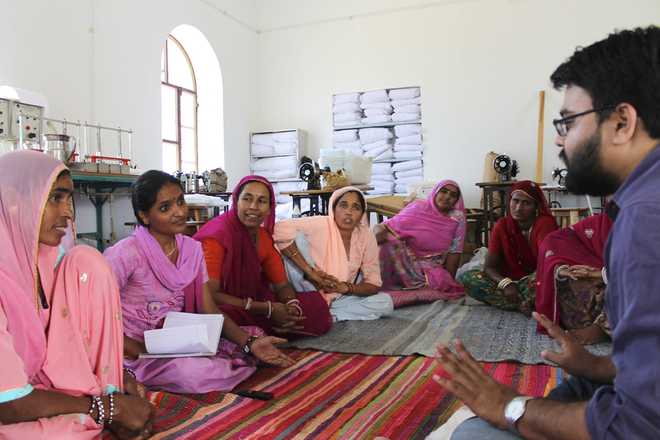
Sombodhi’s venture aims to eliminate the social stigma attached to menstruation
Geetu Vaid
It was not just the challenge of setting up a new venture and introducing a new machine and a product in an unexplored market, when Sombodhi Ghosh walked into the start up zone in 2011, he was also up against social taboo and cultural restrictions. The product that this 27-year-old co-founder of Aakar Innovations wanted to introduce was a low-cost sanitary napkin and his market base comprised rural and underprivileged women with very low hygiene awareness. Recalling his initial experiences, he says, “It was tough to put across the benefits of this product to women as we were a couple of guys venturing into a very personal space.” His company is the only one in the country that produces fully bio-degradable and BIS standard sanitary pads at very low price (production cost of each napkin is about Rs 1.50 and is likely to sell at Rs 2 to Rs 2.25) for women in the lower income segment. Sombodhi has been working to empower women with effective and hygienic healthcare protection besides creating job opportunities for them. “This venture is committed to end the discrimination that women suffer for something as natural as menstruation and to ensure that they don’t have to drop out of school or lose work days just because they are having their period”, says this graduate in microbiology who quit his job in process consulting to start a social enterprise.
Ghosh along with the founder Jaydeep Mandal wanted to develop micro-enterprise models by exploiting the commercial angle of grassroot innovations. After a three-and-a-half-year long R&D stint they developed a six-part machine that can work on 1.5KW inverters. Innovation, hardwork and zeal to improve lives has been the fuel for this young entrepreneur as he recalls, “The odds against us were phenomenal in the beginning as there was not only lack of information and awareness about the project, but there also was lack of funds for R&D required to develop and market the product. But we made several innovations in this venture. On the technology front we have developed our own machine. The raw material that is being used has also been developed after thorough research, the design too has been evolved to make it user-friendly”. The fruits of all this labour, too, have been sweet as in less than four years the enterprise has not only touched Rs1.2 crore revenue mark but is also spread in over 12 states with 27 production units. The project has been supported by the Centre for Innovation, Incubation and Entrepreneurship at the Indian Institute of Management, Ahmedabad, by Prof Anil Gupta and the National Innovation Foundation and the Council of Scientific and Industrial Research. It has also been recommended by The Millennium Alliance (a joint initiative among the Federation of Indian Chambers of Commerce and Industry, the Department of Science and Technology, and the United States Agency for International Development) as one of the top three Indian innovations in the family planning and reproductive health sector.
Christened “Anandi”, these sanitary pads are manufactured in mini factories that are run like a cottage industry with easy-to-operate machines. Each unit has four types of machines and one specialised tool, all created by Aakar innovations for which the women are given basic training after which they can run these factories on their own manufacturing quality napkins at nominal cost. Each factory provides part-time employment to around 15 women besides indirectly benefiting another 15-20 women through marketing commission. Removing the social stigma attached to menstruation is also a part of the mission of this entrepreneur’s venture as the women in rural areas are trained to become village entrepreneurs and end-of-the-line distributors of the product who generate awareness about the hygiene aspect and offer solutions to the target groups. Ghosh believes that the true benefit of social enterprises is possible if the groups have stake in the business and assimilating this in his business model he says that his effort is to make women buy the machine rather than it being gifted to them. “If we have to educate rural women about periods, hygiene and sanitary napkins, we believe they should first be involved in making them,” says Ghosh. The Anandi wave is truly changing the lives of women in more ways than one.



























